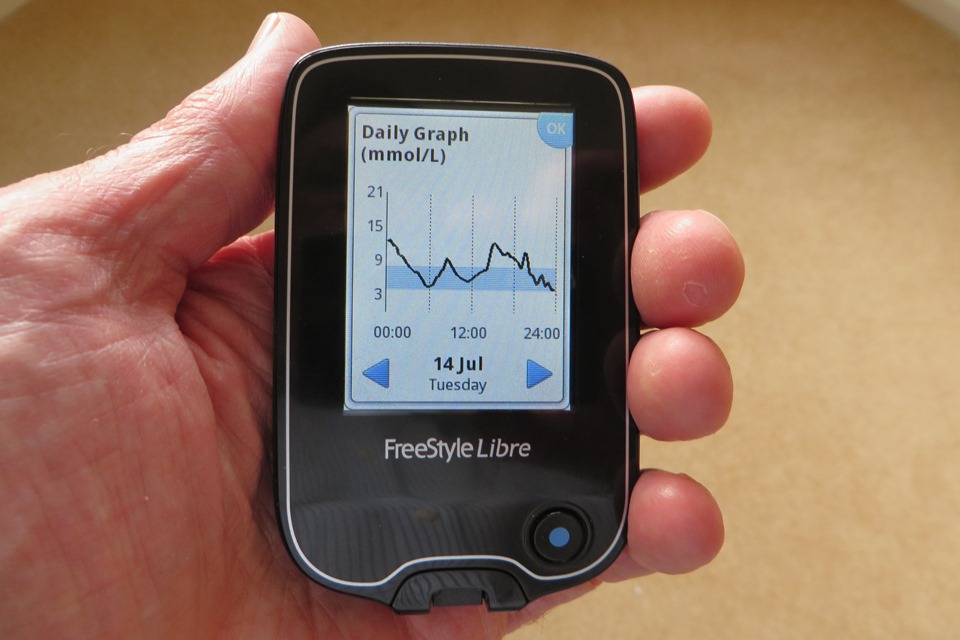I’ve had Type One Diabetes for most of my life. As I’ve stated earlier here, one of the biggest things I’ve discovered to help people with diabetes is the Freestyle Libre glucose monitor. So I was delighted to hear last year that this item could be available on prescription from the 1st November 2017.
I contacted my GP to arrange getting this on prescription. He suggested I speak to a nurse who specialises in diabetes. She said I should speak to a doctor in the New Year, as a decision (I think by the clinical commissioning group in Cheshire) hasn’t been made. I’m still waiting to get this on prescription…
So why is this important? The reader cost me nearly £50, but it’s the sensors that cost me about £3.80 a day that are the real issue. Since these devices became available to me, in the summer of 2015, I’ve spent nearly £4,000 on them. As my salary is around the living wage, this is quite a significant cost.
Why do I spend all this money, and why should I expect the NHS to buy this for me? The consequences of badly controlled diabetes are horrendous. A significant proportion of the NHS budget for England and Wales is already spent on diabetes. This site estimated that the cost in 2012 was £14 billion pounds a year, or over £25,000 being spent on diabetes every minute!
As a person with diabetes, if I don’t control the disease, I am more at risk of complications. For instance, I am potentially more at risk of having kidney failure. The average cost of dialysis is £30,800 per patient per year. I am potentially more at risk of heart disease. Cardiovascular disease is estimated cost the UK economy (including premature death, disability and informal costs) £19 billion each year. I am more at risk of many other serious complications, like needing amputations and going blind.
If my blood sugars go too low I can quickly go into a coma, potentially requiring an ambulance. If my blood sugars are too high, I can also go into a different sort of coma, and I’d be wrecking my own body. Since using these monitors, I now have a much better idea of what different foods are doing to my blood sugars. I now have 24 hours a day surveillance of my blood sugars, and know whether they are going up or down, and can hopefully avoid problems.
The total cost of diabetes to the country is far higher than what I’ve hinted above – when other costs, like absenteeism, early retirement and social benefits, are added. So I regard the cost of these sensors is a small price for the NHS to pay to try and avoid far more expensive complications. Far more is spent on dealing with the complications than treating the disease – so I consider not making these devices available on prescription is penny wise, but pounds foolish.
I note that Theresa May, who also has diabetes, uses this device. This site suggests her salary is over £150,000, but that’s only a tiny fraction of the total perks she gets. So I suspect the cost of another sensor for Theresa May is probably not a major consideration for her, whilst others go without completely….


Brilliant post.
I think this sort of short-sighted thinking from the government is, unfortunately, widespread across the NHS and public services, and it often ends up costing the tax payer more in the long run because it’s a false economy.
And that’s just the money side of things, nevermind the distress it causes for people.
I’ll give you another example.
My Dad has bipolar.
Back in 2010, the Conservatives closed mental health wards across the country, including the one at Leighton in Crewe.
So, when my Dad was sectioned two years later in 2012, he was sent to Macclesfield.
His average ‘recovery’ time at Leighton was 4-5 weeks. He was in Macc for 3 months. That wasn’t because he was any worse at point of admission, it’s because he was far away from home and thus family couldn’t visit as often, an important part of the recovery process for someone with a serious psychiatric disorder.
Furthermore, I had to take afternoons off work to go and see him, thus impacting on my wages, my tax and NI contributions, whilst causing disruption to my employer.
It also must have put 10-20 mental health nurses and other staff out of work. Nurses that they’re now crying out for, and we’ll all have to pay to train up.
As I say, it’s a false economy and, at times, is unforgivable.
Enjoy your website though – keep up the great work!